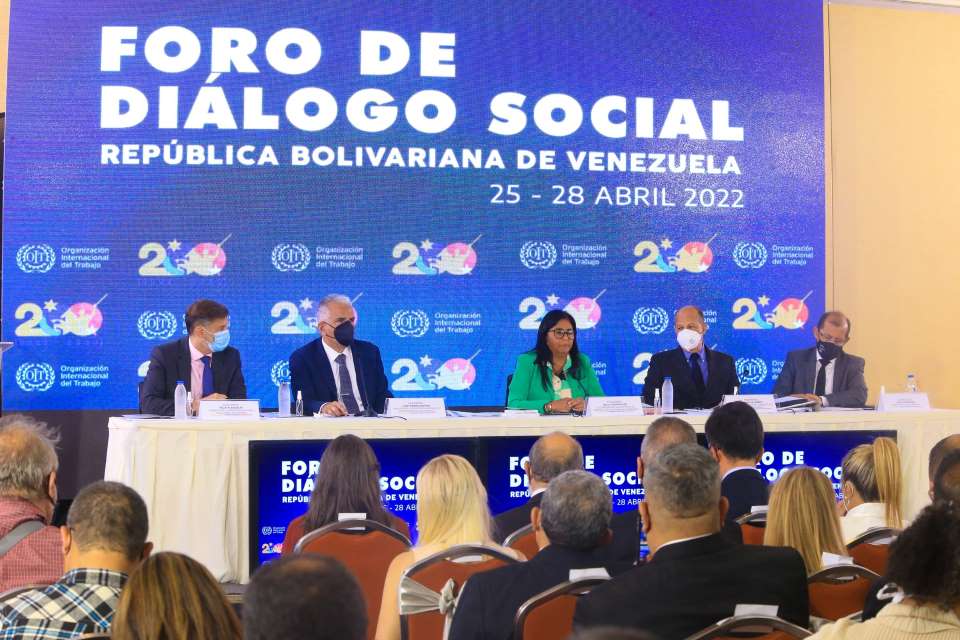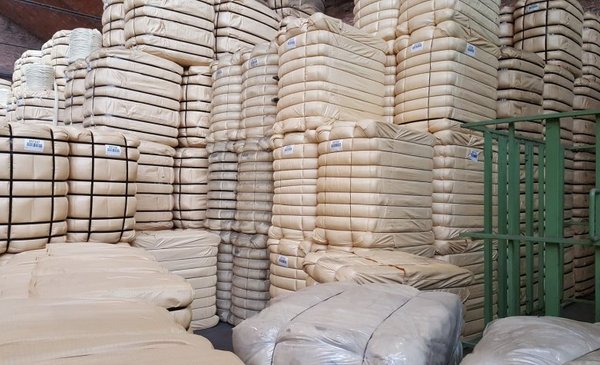Jorge Roig, a member of the ILO Board of Directors, said he was convinced that after these meetings the Government, from now on, will not make increases in the minimum wage “without proper consultation and without getting up early.” Since Monday, six trade union centers and Fedecamaras had the technical support of a team of nine people from the ILO. Part of that delegation was received on Wednesday by Nicolás Maduro in Miraflores
This Thursday, April 28, the work days of the Social Dialogue Forum that were installed last Monday 25 and that broke the isolation of Venezuela that for 29 years —of which the last 22 have been exclusively under the Chavista regime— culminated. a delegation from the International Labor Organization (ILO).
The spokespersons involved have agreed that the technical support of the ILO team aims to identify aspects of coincidence and a clear methodology that allows advancing the pending agenda.
Although the trade union organizations have expressly requested that an ILO official remain in Venezuela; the former president of Fedecamaras, Jorge Roig, a member of the ILO Board of Directors, explained that this will not be possible, but that from the Lima headquarters, the ILO will monitor the process with the commitment that the national actors will keep the therefore, for which a registration and information protocol is established. In this process, the ILO fulfills a role of technical advice and not of tutelage, Roig clarified.
A successful social dialogue forum culminates with the presence of the ILO. 4 days of intense negotiation process that will allow us to advance in the fulfillment of labor agreements by the Venezuelan Government. @fedecamaras pic.twitter.com/0BNjBKRMpb
– Jorge Roig Navarro (@jorgeroig) April 28, 2022
The business leader specified that for ideological reasons the Government of Nicolás Maduro resisted accepting the denomination of these meetings under the name of “tripartite dialogue” and that is why they opted for the name of “Social Dialogue Forum”. He indicated that in practice they have worked under the bipartite scheme, since employers and workers through their respective representations have been able to discuss their complaints with the Ministry of Labor.
“I prefer to be optimistic, but in three days we are not going to solve the 27 years of problems we have,” he said about the systematic violations of the rights of businessmen and workers by the regime.
In an interview after noon on the program Vladimir at 1 Through Globovision, Roig updated the progress until this Thursday 28 and said that the official conclusions will be announced at the end of the day by the authorized sector spokespersons. Although it is not the area that corresponds to him, he did comment that in trade union matters, mechanisms are being agreed upon to improve the functioning of the trade union centrals and have recognition of their autonomy.
He announced that after the minimum guidelines have been set in these four days of work, he is convinced that the Government, from now on, will not make salary increases “without due consultation or early mornings.”
He stressed that in the case of the demands of the employers, it is easier to present them, since there is only one spokesperson, which is Fedecamaras, while the workers have six trade union centers that represent them and that they do not agree with each other on all issues. aspects. He also announced that there will be talk of the return of expropriated land and other aspects that the Government can resolve “with executive measures.”
Closure of the Social Dialogue Forum with the technical assistance of the @ILOnews @carfernandezga @jorgeroig @felipecontodo @epdgiaco pic.twitter.com/8IglFE7p47
– FEDECAMARAS (@fedecamaras) April 28, 2022
The meetings were held at the Renaissance Hotel, east of Caracas, where groups of union leaders arrived to express their demands and demands.
Representatives from the Central ASI (Independent Trade Union Alliance), CTV (Confederation of Workers of Venezuela), Unete (National Union of Workers), CGT (General Confederation of Workers), Codesa (Confederation of Autonomous Trade Unions) attended these meetings with the ILO. of Venezuela) and CBST (Central Bolivariana Socialista de Trabajadores).
Nevertheless, Ruben Gonzalez and José Patines, members of the CGT, denounced having been expelled from the meeting on orders from the Ministry of Labor.
Between Monday the 25th and Thursday the 28th, with the technical support of nine ILO officials, the representatives of employers and workers, as well as the Venezuelan State, reviewed three key aspects that have been a source of conflict due to the continuous violations by the Government of conventions 26, 87 and 144 of the ILO, related to the mechanisms for setting the minimum wage, freedom of association and tripartite consultation, respectively.
On the night of Wednesday the 27th, the ruler Nicolás Maduro received part of the ILO delegation in Miraflores. According to the official note, the mission was made up of Italo Cardona, director of the ILO Office for the Andean countries based in Lima, Peru; Amanda Villatoro, coordinator for Latin America and the Caribbean at the Office for Workers’ Activities (Actrav) based in Geneva, Switzerland; and Roberto Villamil, who works as Senior Counselor and Coordinator for Relations and Technical Cooperation with Latin America at the Office for Employers’ Activities (Actemp), in Geneva.
Excellent meeting with the delegation of the International Labor Organization that is in our country, within the framework of the “Social Dialogue Forum.” Our fight will always be in favor of the Venezuelan Working Class, of which I am proud to belong. pic.twitter.com/MF4OlfWxfT
– Nicolas Maduro (@NicolasMaduro) April 28, 2022
Jorge Roig positively valued both the meeting in Miraflores and the fact that the executive vice president Delcy Rodríguez had been at the Forum installation on Monday, which makes him presume that there is an interest that “this does not remain in a photo.”
In the television interview, Roig stressed that there is a current within the Maduro government that is interested in “returning the purchasing power to the bolivar.” Regarding the next setting of the minimum wage, the employers’ spokesman said he had no information about an announcement that is traditionally made on May 1, but insisted that the amount of the minimum wage should not exceed what each company can pay for ensure that they are not in danger of bankruptcy.
A key breakthrough
The president of Fedecamaras, Adan Celis, highlighted, on the afternoon of this Thursday, April 28, that after so many years of reporting to the ILO on the situation in the country of both the trade union movement and the business sector, the visit of the organization’s high-level commission. He maintained that he hopes that a different coexistence will be achieved between the union sector, the government and the businessmen.
Celis said that within the points addressed is the need for the Tripartite. He added that in order to establish the minimum wage, a discussion must take place between employers, the government and the unions. He recalled that this is an ILO mandate.
“Another important point is that all labor issues go through a tripartite commission. That’s normal. Having demonized tripartite meetings is one of the greatest damages that have been caused to economic relations in the country. In a discussion table, all the edges of the issue must be seen and consensus must be achieved,” Celis said.
He also advocated that the persecution against unions and businessmen cease for the sake of the required recovery of the country.
For his part, the president of the National Federation of Judicial Workers, Emilio Negrín, pointed out that there was no “conclusive agreement” in the dialogue between the International Labor Organization (ILO), the government and different productive sectors.
“There is no conclusive agreement in any aspect, only a permanent commission was installed that will follow up on the new meetings that are going to be held,” Negrín said, in statements to Radio Union.
He argued that the State has not accepted the permanent installation of the commission, but the follow-up of the measures that have been assumed.
Declare a work emergency
Marcela León, from Central ASI, pointed out in interview on televen that the days of the Social Dialogue Forum are “a golden opportunity” to present all the accumulated complaints of the workers’ sector that have not been able to be addressed with the Government due to its refusal to dialogue. He insisted that one of the priority issues to resolve should be the mechanism for fixing the minimum wage.
León recognized in the Ministry of Labor a certain “openness and political will” and believes that it will be possible to apply the recommendations of the ILO Inquiry Commission, the highest investigative body, which in 2019 recommended that freedom of association be respected, as well as that promote national reconciliation and social justice.
He also said that the Central ASI proposed the elaboration of a Labor Emergency Law that addresses urgent aspects of labor relations that “have gone back 80 years.” “We are in a world where artificial intelligence, green employment, and the care economy are coming and we are caught between setbacks and the future, it is time to demonstrate the capabilities of the three actors,” said Marcela León.
For his part, José Elías Torres, general secretary of the CTV, pointed out that they requested six-monthly meetings with the ILO and quarterly bipartite meetings with the government to address problems related to setting and updating the minimum wage and, above all, the problem of the trade union elections and the detained leaders, pointed out a note from Banking and Business.
José García, spokesman for the Unete central, also proposed a new method for setting the minimum wage, arguing that there are currently no economic policies for a sustainable, sufficient and inclusive wage.
“We propose that the commission be established on a frequent, face-to-face basis, that it have the supply of data from the different institutions and the participation of the Central Bank of Venezuela, and that the participation of social actors is also allowed to have the real possibility of adjust and have a salary that is sustainable, sufficient and inclusive”.
Read also: ILO is preparing to put chavismo in line in March if it does not fulfill its commitments
Post Views:
581








